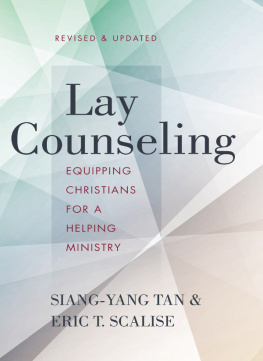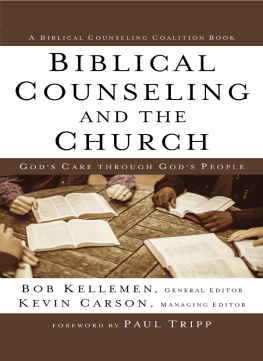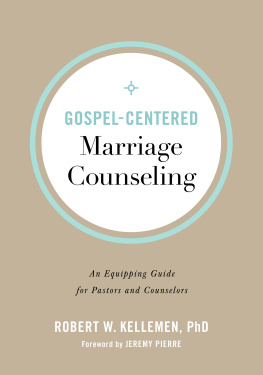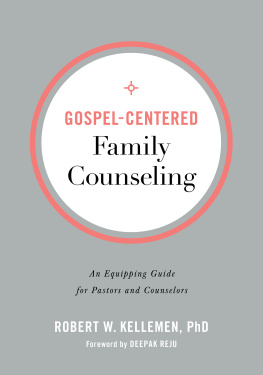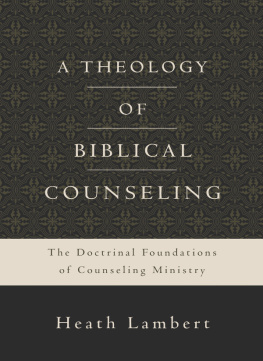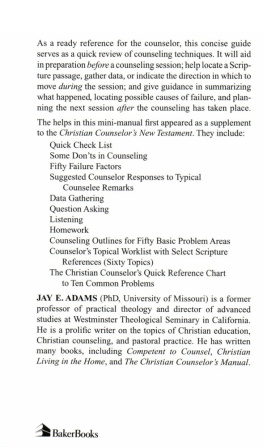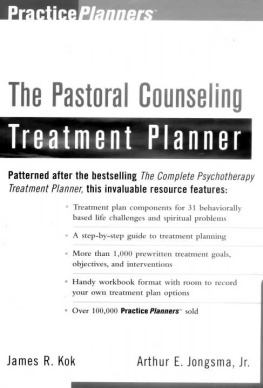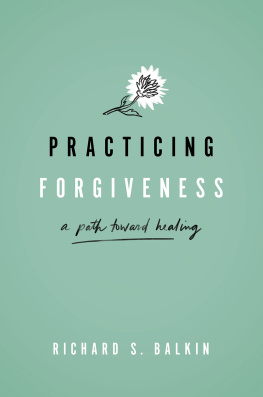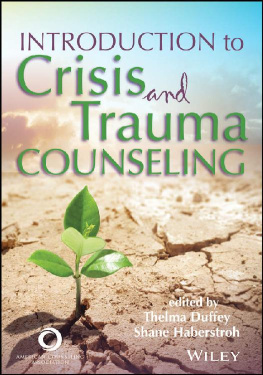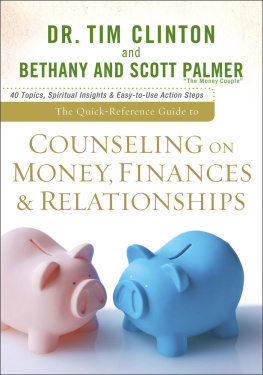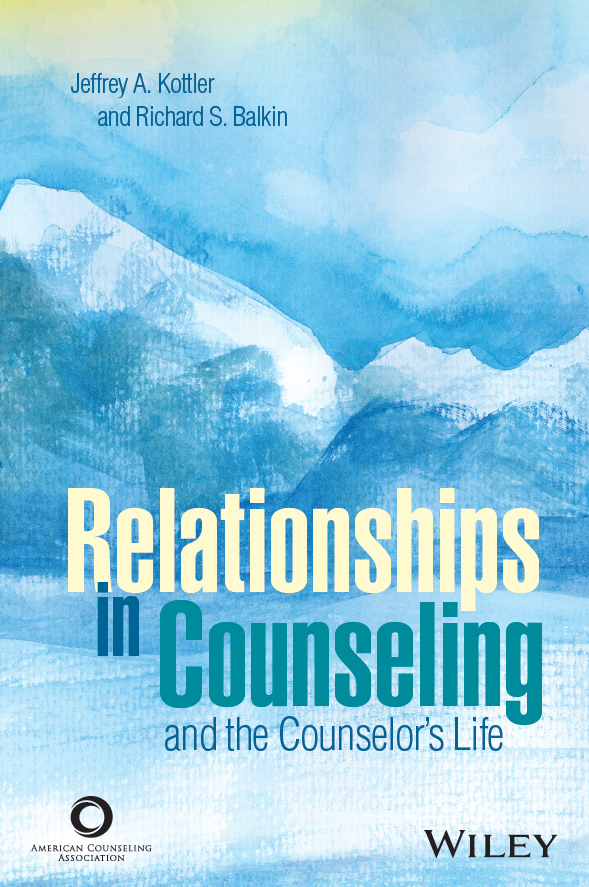
Copyright 2017 by the American Counseling Association. All rights reserved. Printed in the United States of America. Except as permitted under the United States Copyright Act of 1976, no part of this publication may be reproduced or distributed in any form or by any means, or stored in a database or retrieval system, without the written permission of the publisher.
American Counseling Association
6101 Stevenson Avenue, Suite 600 | Alexandria, VA 22304
Associate Publisher Carolyn C. Baker
Digital and Print Development Editor Nancy Driver
Senior Production Manager Bonny E. Gaston
Production Coordinator Karen Thompson
Copy Editor Kay Mikel
Cover and text design by Bonny E. Gaston
Library of Congress Cataloging-in-Publication Data
Names: Kottler, Jeffrey A., author. | Balkin, Richard S., author.
Title: Relationships in counselingand the counselor's life / Jeffrey A. Kottler, Richard S. Balkin.
Description: Alexandria, VA : American Counseling Association, [2017] | Includes bibliographical references and index.
Identifiers: LCCN 2016035471 | ISBN 9781556203602 (pbk. : alk. paper)
Subjects: LCSH: Counseling psychologist and client. | Counseling psychologists. | Counseling psychologyPractice.
Classification: LCC BF636.6 .K685 2017 | DDC 158.3dc23 LC record available at https://lccn.loc.gov/2016035471
Preface
What is truly special about human beings as a species? Is it that we have invented tools to increase our proficiency at gathering food and managing daily life? Is it our development of language? Perhaps it is our complex social behavior? Although we have developed these abilities to an extraordinary degree, at least compared to other inhabitants of the planet, they are hardly unique. After all, chimpanzees have been known to use tools to hunt for food or to defend themselves. Ants and termites are far better organized in their social networks, and dolphins and whales rely on their own verbal language system to communicate regularly.
What distinguishes us from other creatures is that we have developed the capacity for empathy: We are mind readers! Evolution has equipped us with the ability to reliably and accurately sense what others are feeling and to place ourselves in their shoes (or sandals). This has permitted us to decode others' body language, facial expressions, and verbal subtleties in such a way that we can usually assess whether someone is an ally and friend or a potential threat. This has made it possible for us to function more cooperatively within our social groups and to respond sensitively to members of our tribe who need support, reassurance, or assistance. The empathic mind is also what makes counseling work, in all its forms and permutations.
With respect to the practice of counseling relationships, we are talking about a subject so complex and challenging that it defies any simple explanation or easy answers. Dozens of models reflect their own particular emphasis or theoretical orientation, whether in the form of transference, working alliance, real relationship, empathic resonance, collaborative stance, attuned responsiveness, attachment interactions, corrective emotional experience, or immediacy, to mention only a few. Each relational conception attempts to explain, or at least to describe, the mechanisms of change that take place during the time counselors and clients spend together.
In spite of the emphasis on empirically supported treatments (or ESTs), manualized strategies, and evidence-based practice (or EBP), relatively little attention is paid to the results of the studies upon which most models are based. A consensus in the field has emerged that many specific interventions and strategies have limited impact on counseling outcomes compared to the so-called common factors, which include client and counselor characteristics and, especially, the helping relationship. In addition, counselors feel undue pressure to incorporate particular strategies that may actually act as a barrier to more successful helping efforts. We all hunger for new techniques, novel interventions, and revolutionary advances in theory development, sometimes forgetting that the power of the relationship strengthens everything else we do to help people.
This book integrates the evidence supporting relational factors in counseling in a way that is both accessible and clinically useful. In addition, we focus on the reciprocal impact of the counseling alliancehow practitioners, as well as clients, are affected as a result of the intimate encounter, for better or worse.
An Unusual Collaboration and an Improbable Partnership
This is a book about relationships. It is also a story about our own relationship, which began 15 years ago when Rick was a doctoral student, taking an advanced group course that used one of Jeffrey's texts as a primary source. It was the first book in the field in which the author felt real to Rick, so much so that he was determined to meet Jeffrey at the next professional conference. Their first meeting was one of unequal power, with Rick as the deferential student and Jeffrey an established academic. There were other brief meetings at subsequent conferences, but mostly polite encounters. They would not have another conversation for more than 12 years.
Meanwhile, Rick worked hard to establish his own professional identity and reputation as a scholar and counselor educator. While Jeffrey continued writing two or three books each year about relationship issues, Rick mostly concentrated on his own research agenda and teaching, specializing in inferential statistics and assessment instruments (we warned you this was an unusual partnership).
In his wisdom (or audacity), the president of the American Counseling Association, who was a long-standing friend to both of us, as well as being Rick's mentor, invited us to team up to keynote the national conference. Jeffrey's first thoughtand the first words out of his mouth during the keynote speechwas, What the heck was he thinking? It seemed ridiculous, first of all, to invite two people to deliver a speech together about relationships in counseling but particularly so considering that their styles were so completely different, their interests almost in opposite domains, and they hardly knew one another, much less ever collaborated on anything before.
Rick and Jeffrey tried to negotiate their differing opinions about the best format and structure for this speech, which represented one of the highlights of the careers of both men. Jeffrey was far more experienced in this area, having delivered similar keynotes at other international and national conferences in the past, but that didn't mean that Rick was any less opinionated about what they should do and how they should do it. In their dialogue with one another, they eventually settled on the idea of emphasizing process as well as content, which, after all, is what counseling is all about. What can one really do in 40 minutes that makes any kind of difference to an audience of several thousand people crowded in a hot room? They decided they would try to model the kind of relationship that they wished to profile in their talk, one that was collaborative, genuine, warm, engaging, and empowering. You know, the usual.
Jeffrey was quite comfortable with this format and was used to improvising and winging it, depending on his mood and the audience responses, but Rick much preferred a clear structure. As a quantitative researcher, he was far more familiar with presenting findings supported by numbers. He loved the idea that they could write out a script ahead of time and basically get to read it on the teleprompter on stage. However, Jeffrey was insistent that the experience would be more lively, entertaining, and interesting if they tried to
Next page

